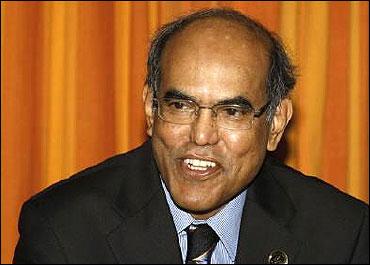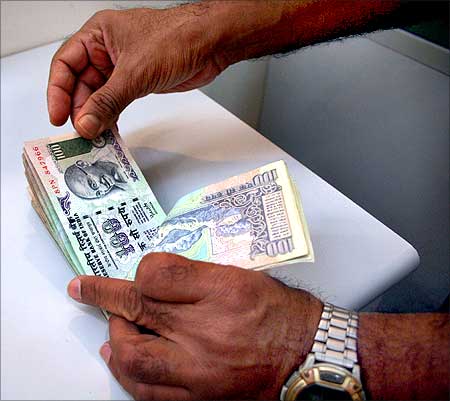 | « Back to article | Print this article |
RBI may give a breather, pause interest rate hike
Amid declining growth and moderating inflation, the Reserve Bank of India is likely to pause hike in interest rate at the mid-quarterly review of the Monetary Policy on Friday.
RBI, which has raised interest rate 13 times since March, 2010 to tame inflation, may change the tight monetary stance as the industrial production has turned negative in October recording a fall of 5.1 per cent.
As regards price situation, although the headline inflation has remained close to double-digit mark in November, there are signs of moderation. The food inflation, according to the data released on Thursday, fell to a nearly four-year low of 4.35 per cent during the week ended December 3.
Click NEXT to read on . . .
RBI may give a breather, pause interest rate hike
The RBI in its mid-year policy in October had indicated that it might halt rise in interest rate if the inflationary situation does not worsen.
The bigger worry on the economic at this time is to arrest falling growth.
"Domestically, the struggle against inflation and tightening interest rate regime has contributed to lowering of growth in demand and investment. The slowdown in industrial growth is of particular concern as it impacts employment," Finance Minister Pranab Mukherjee said in New Delhi.
Click NEXT to read on . . .
RBI may give a breather, pause interest rate hike
State Bank of India Chairman Pratip Chaudhuri had said on Wednesday the he did not expect the RBI to hike interest rate in its next policy.
"I don't think so because food inflation has come down significantly and steadily. RBI has said 7 per cent is the level they are targeting," he told reporters.
Besides, other experts and economists too are of opinion that RBI would pause hike in interest rate because of economic slowdown and decline in rate of price rise.
Click NEXT to read on . . .
RBI may give a breather, pause interest rate hike
Chaudhuri added, however, that he does not expect RBI to slash the Cash Reserve Ratio as it would be contradictory to the monetary stance of targeting inflation.
ICRA economist Aditi Nayar said RBI is likely to keep the rates unchanged because though food inflation has fallen, manufactured products inflation still remains at an elevated level of 7.7 per cent.
"With inflation related to non-food manufactured products rising in November, 2011, RBI is expected to leave the repo rate and the CRR unchanged in the upcoming mid-quarter policy to continue to dampen inflationary expectations," she said.
Click NEXT to read on . . .
RBI may give a breather, pause interest rate hike
The country's GDP expanded by a meagre 6.9 per cent in the second quarter of the current fiscal, the lowest in over two years. India Inc has blamed the rate hikes, which have increased the cost of borrowings, for hindering fresh investments and slowdown in industrial activity.
"We think the RBI will go for a pause. It is still too early to reverse the rates. Manufactured inflation still remains above 7 per cent and is likely to remain high as rupee depreciation has made imports expensive.
"We expect rate cuts to come in the first quarter of 2012," Crisil chief economist D K Joshi said.
Click NEXT to read on . . .
RBI may give a breather, pause interest rate hike
Industry bodies like CII and Ficci have already called upon the RBI to cut rates for ensuring industrial revival.
According to Goldman Sachs, the negative growth in IIP numbers increases the probability of an early reserve requirement cut by RBI.
"Our current expectation remains that the RBI will continue to inject liquidity through open market operations, and then cut the reserve requirement ratios of banks in January, followed by repo rate cuts in March, 2012. We continue to expect the RBI to cut policy rates by an above-consensus 150 bps in 2012," Goldman Sachs said in a report.





